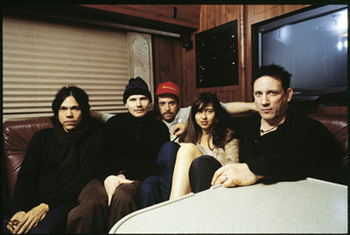 γνῶθι σεαυτόν
γνῶθι σεαυτόν
Know thyself. Inscribed upon the Oracle of Apollo at Delphi, the priestess Pythia (the alleged author of that aphorism) could have been directly inspired by Apollo (the god of light and music)himself to speak directly to Billy Corgan, the leading light of the now-defunct, one-album supergroup Zwan*. Comprised of former members of semi-prominent alternative rock bands (okay, they were semi-prominent in the alt-rock world; in the mainstream world, no one ever heard of the bands Slint, Chavez, and A Perfect Circle; all making the moniker supergroup for this band kind of, uh, relative) as well as two members (Corgan and his drummer Jimmy "I-Wouldn't-Know-A-Straight-Beat-If-It-Fell-On-My-Foot-And-Kicked-The-Drum-Itself" Chamberlain) of a very prominent alternative rock band, Zwan set out to make loud, distorted, melodic, romantic rock and roll...all-in-all, quite the departure from the previous couple of albums from Corgan's previous band Smashing Pumpkins (who once made loud, distorted, melodic, angsty rock and roll), whose music had started to drift off into the experimental electronic ether.
The first single from Zwan's only album Mary Star of the Sea, "Honestly" seems at first listen to be a simple paean to romance, a confession of love, a Hallmark card that opens to the sound of a memorable melody backed by layers upon layers of distorted guitar and a chorus of melding voices, all filtered through a flanger effects pedal. It's power-pop at it's most romantic, the sweet sentiment and melody tempered by the heavy (but not too heavy) rock and roll (the roll is important, as this isn't a power ballad) underneath. It sounds just like an early (first three albums) Smashing Pumpkins record; in fact, "Honestly" is the best straight-forward/traditional rock-and-roll record the Pumpkins never made. It's a solid record....
...but it doesn't seem to be truly extraordinary. It's not inventive, it's not innovative, and it's more than a bit derivative; it seems to be just disposable hard rock, just a bit of ephemera...upon first listen. A closer inspection of the song (and the kitchen-sink production of the music here makes this inspection a worthwhile study, as all the different parts of the song seem to fuse together as one, giving the record a very holistic sound, with no single element ever jumping out to jar or startle or make one take especial notice) yields fascinating lyrical depth. On the surface, the words seem pretty simplistic, as Corgan seems to push the more prosaic phrases ("I feel love," "There's no place I could be without you," "I believe") to the forefront. Underneath the veneer and connecting the aforementioned lines are words that suggest the speaker's doubt ("I don't know, honestly") in the relationship ("Is it true/Do I care?"), his conflicting emotions ("I'll break your heart so you must ask/Is this the way to get us back"), and maybe some control issues ("When I think of you as mine"). The speaker may even indeed be living in a fantasy world, nostalgia coloring his perception of the past, remembering only what he wants to remember, convincing himself that his perception of their (he and his lover's) time together is reality ("you can try to wipe the memories aside/But it's only you that you erase"), unwilling to admit that perhaps what he believes to true--the perfect romance--may only be in his mind, refusing to acknowledge any other reality than the one he perceives, for in that direction ("It's too far to discard the life I once knew") lies the destruction of self; therefore, the speaker begins the song by chanting a mantra: "I believe." If he tells himself that enough times, perhaps it will be true. He must swear an oath to it, so that not only will his lover believe him, but that he will believe himself. The oath? It's the title of the song. As Shakespeare wrote:
No, not an oath: if not the face of men,/The sufferance of our souls, the time's abuse--/If these be motives weak, break off betimes,/And every man hence to his idle bed....and what other oath/Than honesty to honesty engaged,/That this shall be, or we will fall for it?
...or, as my father would say, if you're saying "honestly" now, does that mean that I shouldn't believe you the rest the time?
*Notes - Zwan is certainly an unusual name. Corgan has stated that he chose the name just because he liked the way it sounded. I buy that. Of course, knowing Corgan's lyrical and thematic fascination with the Gods, I wasn't surprised to find out that Zwan is an actual word. It's meaning: Greek spam. Apropros, I believe.









No comments:
Post a Comment